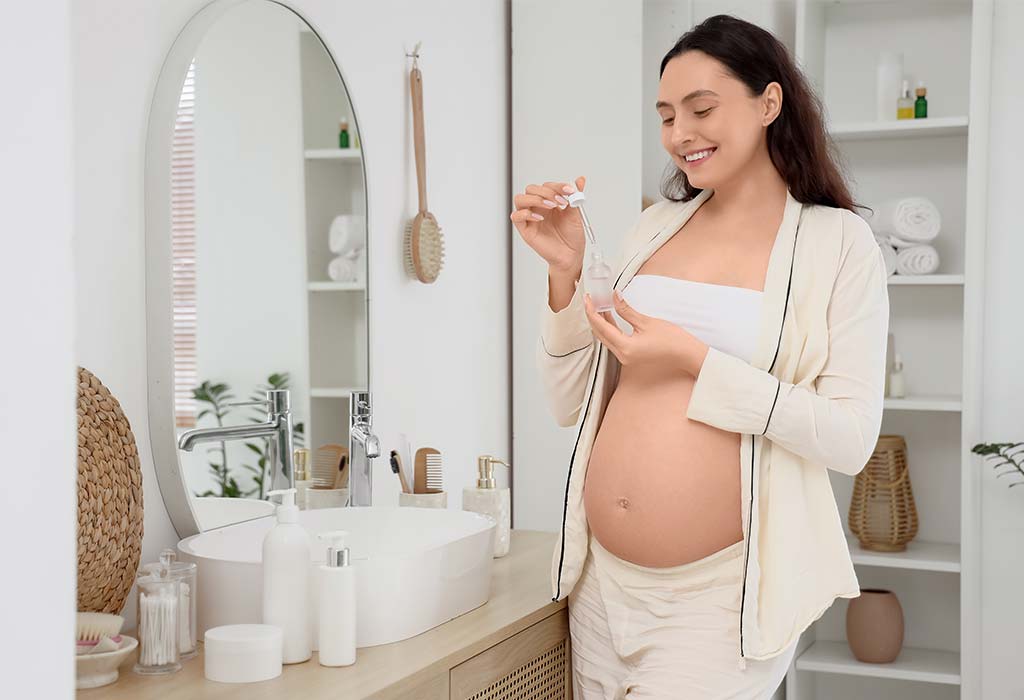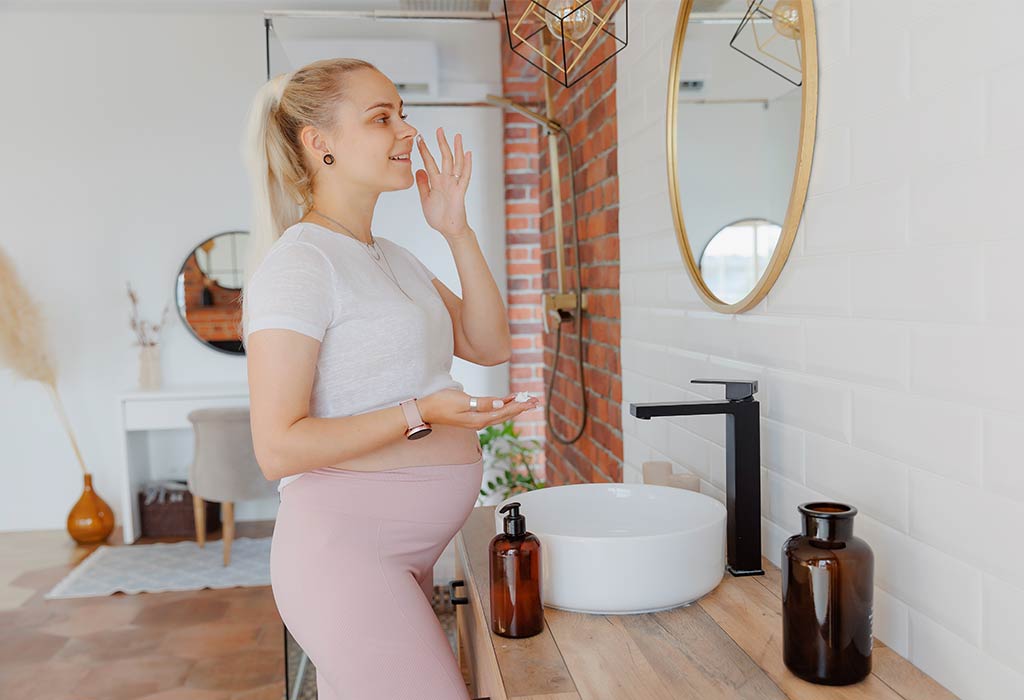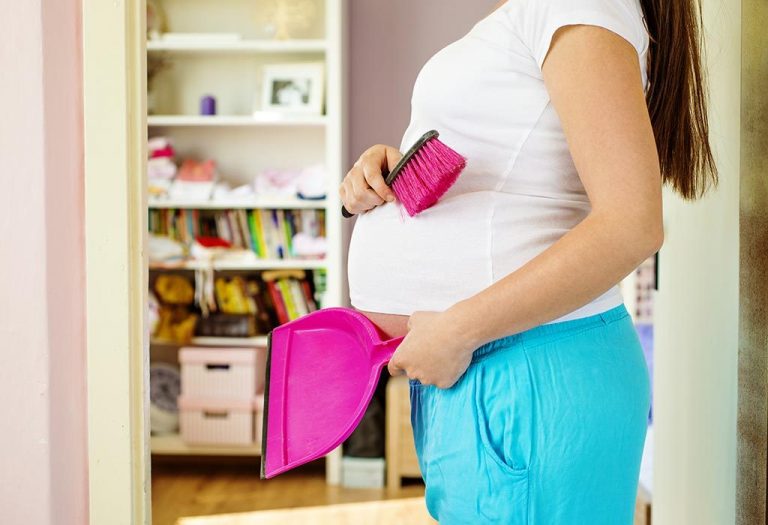Is it Safe to Use Hyaluronic Acid in Pregnancy
Pregnancy can make you second-guess everything, even your favourite skincare. You’re probably staring at that hyaluronic acid serum right now, thinking, “Is it okay for me to use hyaluronic acid in pregnancy?” Totally normal. In fact, so many moms-to-be have the exact same thought. We all want that fresh, hydrated glow, but without a single worry about what’s safe for the baby. With so much advice floating around, it’s easy to feel unsure. Don’t worry; we’ve done the digging for you. If you’re curious whether this hydration booster is a friend or foe during pregnancy, you’ll want to stick around. Your skin will thank you!
What Is Hyaluronic Acid?
Hyaluronic acid is naturally found in our bodies, especially in the skin. Its main job is to keep skin hydrated and smooth by holding in water. In fact, it can hold up to 1,000 times its weight in moisture, making it one of the most effective ingredients for skin hydration. In skincare products, it’s often used in serums, creams, and masks to boost hydration and improve the skin’s texture. Because of its ability to attract and retain water, hyaluronic acid has become a go-to ingredient for anyone looking to keep their skin soft, healthy, and glowing (1) (2).
Is Hyaluronic Acid Safe for Pregnancy?
Hyaluronic acid is generally considered safe to use during pregnancy. Since it’s a substance your body naturally produces, it’s well-tolerated by most people, including expecting mothers. When used in skincare products, it works on the surface of the skin to provide hydration and doesn’t get absorbed deeply into the bloodstream. That means there’s very little risk to you or your baby (3).
Benefits of Using Hyaluronic Acid While Pregnant
Now that we’ve cleared up the fact that hyaluronic acid is safe to use during pregnancy, let’s talk about why it’s an essential skincare product during this special time.
1. Deep Hydration
Hyaluronic acid is a moisture magnet, able to hold up to 1,000 times its weight in water. During pregnancy, hormonal changes can often lead to dry, tight skin, and hyaluronic acid helps combat that by drawing moisture into the skin and locking it in. This deep hydration keeps your skin feeling soft, plump and refreshed all day (4).
2. Plump, Smooth Skin
Hyaluronic acid helps improve skin texture by maintaining optimal moisture levels, making it look smoother and more youthful. It also supports your skin’s natural elasticity, which can be especially helpful as your body changes during pregnancy. This means your skin can stay soft and bouncy, helping to minimise the appearance of fine lines and wrinkles (5).
3. Reduces Stretch Marks
While stretch marks are common during pregnancy, keeping your skin well-hydrated with hyaluronic acid can help improve its elasticity. Hydrated skin is more resilient and less prone to tearing, which can reduce the severity and appearance of stretch marks. While it won’t eliminate them entirely, it can make a noticeable difference in how your skin stretches (6).
4. Gentle on Sensitive Skin
Pregnancy can make your skin more sensitive, and some products can irritate or cause breakouts. Hyaluronic acid, however, is a natural substance that’s gentle on the skin, making it an excellent choice for those dealing with pregnancy-related skin changes. It’s usually well-tolerated, even by sensitive or reactive skin.
Retinol vs. Hyaluronic Acid
While hyaluronic acid is a popular and pregnancy-safe option, retinol is off-limits during pregnancy. Retinol, a form of Vitamin A, is commonly used for its anti-ageing and acne-fighting benefits, but when it comes to pregnancy, it requires a bit more caution (7). High doses of Vitamin A, especially in oral forms like isotretinoin, have been linked to serious birth defects, which is why many experts recommend steering clear of retinol during pregnancy (8).
Even though the amount of retinol absorbed from topical products is much smaller, it’s still enough to raise concerns. As a result, most doctors advise against using skincare products that contain retinol while pregnant (9). This makes hyaluronic acid a trusted and popular choice for many expecting mothers looking for a safe yet effective skincare option.
Precautions to Take While Applying Hyaluronic Acid While Pregnant
Hyaluronic acid is safe during pregnancy, but as with anything, it’s always good to take a few extra precautions. Here’s what you should keep in mind:
- Check the full ingredient list to be sure there are no harmful additives like retinol, salicylic acid, or strong essential oils.
- Go for fragrance-free and hypoallergenic options to avoid irritation on sensitive pregnancy skin.
- Do a patch test on a small area before applying any new product to your whole face.
- A little goes a long way; overusing any product can sometimes cause irritation.
Pregnancy Skin Care Routine With Hyaluronic Acid
Your skin goes through a lot during pregnancy, so it’s important to keep your routine simple and safe. Here’s a simple skincare routine with hyaluronic acid you can follow during pregnancy.
1. Cleanser
Start your routine with a gentle, non-stripping cleanser that removes dirt and excess oil without disrupting your skin’s natural barrier. Look for fragrance-free or hypoallergenic formulas to avoid irritation, which is common during pregnancy.
2. Serum
After cleansing, apply a pregnancy-safe hyaluronic acid serum to damp skin. This helps lock in moisture, keeping your skin plump, soft, and healthy. Choose serums that are free from added retinoids, parabens, and other harmful ingredients.
3. Moisturiser
Seal in the hydration with a rich but non-comedogenic moisturiser. Look for products that complement hyaluronic acid by including ingredients like ceramides, glycerin, or shea butter to enhance skin elasticity and comfort.
4. Mask (Weekly)
Boost your skin’s hydration levels once a week with a hyaluronic acid-infused mask. This extra step provides deep moisture, helps combat pregnancy-related dryness, and leaves your skin feeling refreshed and supple. Opt for masks that are free from artificial fragrances and strong actives.
Ingredients to Avoid While Pregnancy Skin Care
When you’re pregnant, your skin can become more sensitive, so it’s especially important to choose products that are safe for both you and your baby. While hyaluronic acid is a great option, there are several ingredients in skincare products that can be harmful during pregnancy. Here are a few to avoid:
1. Retinoids (Vitamin A)
Retinoids, such as retinol, tretinoin, and isotretinoin, are commonly used to treat acne and reduce signs of ageing. However, these forms of Vitamin A can cause birth defects when used during pregnancy. Even though topical retinoids are absorbed less than oral ones, it’s still best to avoid them to be safe (9).
2. Salicylic Acid (High Concentrations)
Salicylic acid is a common ingredient in acne treatments and exfoliating products. While it’s generally safe in low concentrations, high doses, especially in products like peels or oral medications, can pose risks during pregnancy. It’s best to avoid salicylic acid and opt for gentler alternatives if you’re looking for acne treatments.
3. Formaldehyde
Formaldehyde is a chemical commonly found in some hair treatments, nail products, and skincare products as a preservative. It is considered a potential carcinogen and can be harmful during pregnancy. Even low levels of formaldehyde exposure can increase the risk of health complications, so it’s best to avoid any products that contain this ingredient (10).
4. Botox
Botox (botulinum toxin) is a popular treatment for wrinkles, but it’s not recommended during pregnancy. The safety of Botox during pregnancy has not been fully studied, and there is concern that the toxin could potentially affect the fetus. It’s best to avoid any injectable treatments, including Botox, while pregnant to be on the safe side (11).
FAQs
1. Can hyaluronic acid be used in injectable forms during pregnancy?
Injectable hyaluronic acid fillers are not recommended during pregnancy. Although topical use is safe, most experts advise avoiding cosmetic injections like dermal fillers until after childbirth due to a lack of research on their effects during pregnancy (12).
2. Are there alternative ingredients to hyaluronic acid for pregnancy?
If you’re cautious, alternatives like glycerin, aloe vera, and vitamin E are also excellent pregnancy-safe moisturisers. However, hyaluronic acid remains one of the safest and most effective options available.
Choosing what’s right for your skin during pregnancy can feel overwhelming, but it doesn’t have to be. Hyaluronic acid and pregnancy are considered a safe combination, giving you a trusted option to keep your skin nourished without worry. As always, it’s a good idea to check with your doctor if you have any concerns. Focus on what makes you feel good, and enjoy this special time while taking small steps to care for yourself.
References/Resources:
1. Cleveland Clinic – Hyaluronic Acid
2. National Library of Medicine – Hyaluronic Acid
3. Harvard Health Publishing – The hype on hyaluronic acid
6. American Academy of Dermatology – STRETCH MARKS: WHY THEY APPEAR AND HOW TO GET RID OF THEM
8. National Library of Medicine – Isotretinoin
9. PubMed Central – Safety of skin care products during pregnancy
10. PubMed – Formaldehyde exposure during pregnancy
11. Cleveland Clinic – Botox and Pregnancy: Is It Safe?
12. National Library of Medicine – Hyaluronic Acid
13. American Society for Dermatologic Surgery – Injectable Hyaluronic Acid
Also Read:
Salicylic Acid in Pregnancy
Safe Skincare Products in Pregnancy
Pregnancy Beauty Tips for Glowing Skin
Is it Safe to Wear Makeup During Pregnancy?
Using Perfume and Deodorant during Pregnancy
Was This Article Helpful?
Parenting is a huge responsibility, for you as a caregiver, but also for us as a parenting content platform. We understand that and take our responsibility of creating credible content seriously. FirstCry Parenting articles are written and published only after extensive research using factually sound references to deliver quality content that is accurate, validated by experts, and completely reliable. To understand how we go about creating content that is credible, read our editorial policy here.





































